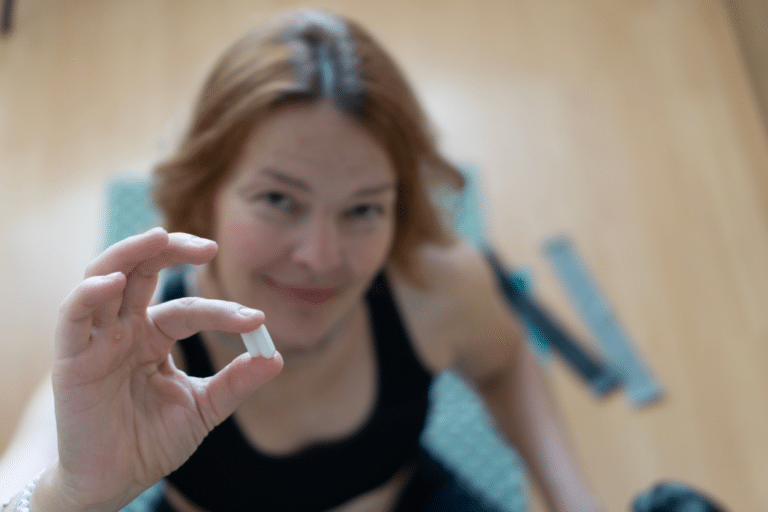One of the most common questions I’m asked in the Hormone Harmony Club is, “What is going on with my period!?” Is this normal? Do I need to see my doctor?”
These women are experiencing flooding, clots, short cycles, abnormally long periods, cramping, and symptoms that are alarming and, in some cases, life-altering.
While it would be nice if there was an on/off switch when it comes to periods and perimenopause, this is not usually the case. Changes in your cycle are a tip-off that perimenopause has arrived, and there is a wide range of experiences that are all “normal.”
Take me, for instance. I was a 28-day girl like clockwork. You could set your watch by my cycle. Then, I started having periods every 2 weeks. NO BUENO! Then I’d go 6 weeks or so with nothing. Now it’s been 6 months and I am praying the off switch has been permanently pulled!
What’s Normal?
For most women, the average cycle length is 25-31 days, with bleeding that lasts about 5 days. Irregular periods are defined as changes in this typical cycle and are characterized by abnormal bleeding and/or unusual cycle lengths. Cycle changes can begin as early as your mid-30s.
Causes of Irregular Periods
For women in perimenopause, the most likely cause of irregular periods is fluctuating hormonal levels. The menstrual cycle is controlled by estrogen and progesterone, both of which begin to decline in a woman’s 40s and 50s….with progesterone falling first. With progesterone out of the picture, estrogen is allowed to run wild. This leads to continued thickening of the uterine lining, which, when it is shed, results in heavy bleeding, clots, cramping, and long cycles. As perimenopause progresses and estrogen levels fall, bleeding tends to be less heavy, and skipping of cycles begins.
Can I Still Get Pregnant?
Many women wonder about their fertility when they begin to experience irregular periods. It is important to remember that pregnancy can occur anytime before menopause, even if a woman’s periods are irregular. It is not uncommon during perimenopause to go months without a period only to have it return. During this time, it is still possible to become pregnant.
How to Manage Irregular Periods
A three-tiered approach can be used to manage bothersome symptoms. I generally recommend using lifestyle changes and supplements together before moving to surgical options.
1. Lifestyle changes
Lifestyle changes can help with irregular periods. Leading a sedentary lifestyle or consuming too much caffeine or alcohol can exacerbate symptoms. Increased stress can also increase the severity of irregular periods. Stress-relief techniques such as yoga or meditation can be helpful for this.
Some simple dietary changes can also be helpful. Increasing the intake of complex carbohydrates, fruits, vegetables, fiber, and water can help balance the hormone. Avoid foods and products that contain xenoestrogens, such as soy, plastics, pesticides, and cosmetics, because they can alter estrogen levels.
2. Supplements
Supplements that target improvement of the progesterone/estrogen ratio can be helpful for managing symptoms like flooding, cramps, and clotting. Chasteberry is one supplement that is helpful, however, it is less effective the closer a woman is to menopause. Bio-identical progesterone supplementation can also be very effective for heavy or prolonged bleeding. The goal is not necessarily to completely normalize cycles but to control symptoms that affect quality of life.
Vitamin C with Bioflavonoids – 2,000-4,000 mg/day – has an anti-estrogenic effect on the uterus. A study showed that vitamin C was able to reduce heavy bleeding in 87% of women who participated. Bioflavonoids were also shown to strengthen the vessel walls of the capillaries, further reducing the bleeding.
DIM (diindolylmethane) or IC3 (indole-3-carbinol), which are both created from compounds in cruciferous vegetables, help improve estrogen metabolism and lower estrogen levels thus improving the balance of estrogen/progesterone.
There are also herbs like shepherd’s purse that can help control heavy bleeding.
3. Medications
Doctors will often prescribe birth control pills or a hormone-releasing IUD to control period problems. Birth control pills shut down hormone production completely (thus putting a Band-Aid over the imbalance) but have recently been shown, along with the progestin-containing IUDs, to increase a woman’s risk of breast cancer if used long-term.
Ibuprofen can help control heavy bleeding, but is not a great long-term solution as it can affect blood pressure and increase the likelihood of stomach ulcers. When used short-term during your period, it can be very effective at slowing bleeding.
Tranexamic acid is another medication that helps decrease bleeding. Tranexamic acid works by slowing the breakdown of blood clots, which helps to prevent prolonged bleeding. It belongs to a class of drugs known as antifibrinolytics.
Tranexamic acid is not a hormone. It does not treat other menstrual or pre-menstrual symptoms. It does not stop your period. It is not a form of birth control and does not protect against sexually transmitted diseases.
Surgery
Surgical alternatives such as hysterectomy or endometrial ablation are options for women who have tried other options without success.
When to See Your Doctor
It is very common during perimenopause to have irregular periods, but there are other reasons abnormal bleeding can happen. Hypothyroidism, blood clotting issues, fibroids, pregnancy and occasionally cancer are some of the reasons that might cause this. Any bleeding AFTER menopause should also be evaluated by your doctor.
Dr. Anna Garrett is a menopause expert and Doctor of Pharmacy. She helps women who are struggling with symptoms of perimenopause and menopause find natural hormone-balancing solutions so they can rock their mojo through midlife and beyond. Dr. Anna is the author of Perimenopause: The Savvy Sister’s Guide to Hormone Harmony. Order your copy at www.perimenopausebook.com.
Dr. Anna is available for 1-1 consultations. Find out more at www.drannagarrett.com/lets-




